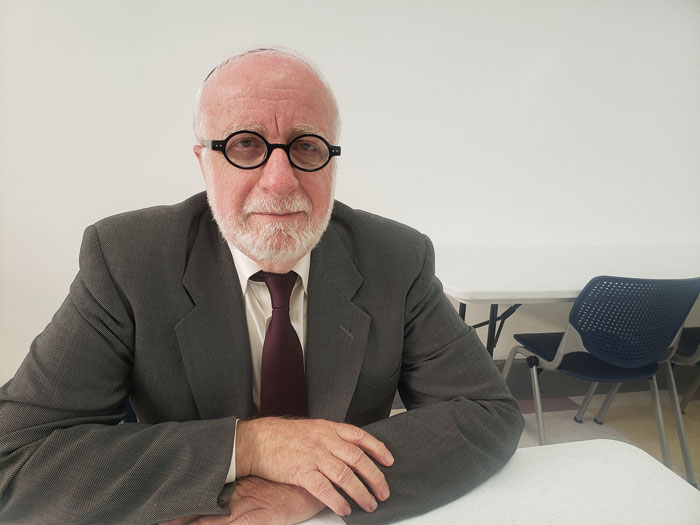 Rabbi Moises Benzaquen
Photo by Ari L. Noonan
Rabbi Moises Benzaquen
Photo by Ari L. Noonan When the Gaza War broke out in Israel in 2014, a member of the West Coast Torah Center, an Orthodox synagogue founded by Rabbi Moises Benzaquen, approached him with an urgent message.
“We have to go to Israel,” the man said. “We have to do something.”
In June 2014, Palestinian terrorists had ignited the latest firestorm by kidnapping and murdering three Israeli teenagers.
Benzaquen felt the urgency to go and offer aid. But he also had to balance responsibilities here. He had just founded Yeshiva Hi-Tech High School, an innovative school that offered blended learning using the latest technology. It would soon change its name.
Since war waits for no man, the Spanish-born rabbi – who will accept the Founder’s Award at a February 15 school banquet at The Luxe Hotel – greenlighted the trip.
Accompanied by a dozen activists, the Benzaquen group would go to a kibbutz near the frontier with Gaza every day, the rabbi said.
“Soldiers would come by, and we would have prepared food for them.”
Then came a game-changing moment. Benzaquen turned to a friend who operated the community center in Kiryat Arba and told him he would like to meet with the parents of the teenage victims. First he met with the oldest boy’s parents, Naftali Fraenkel’s Moroccan mother and Yemenite father. “They were showing me pictures of this unbelievable kid,” Benzaquen said. “He was going to go into the army when (his life) was cut short.”
The Fraenkel parents went out to the kitchen, leaving the rabbi alone, but not for long. Naftali’s 15-year-old brother passed through. He was going out for a run. “He looked at me first,” said Benzaquen, “and said, ‘Would you like to know who my brother was?’” In the middle of the shivah for Naftali, his brother told Benzaquen, a girl called. “We didn’t know he had a girlfriend. She said, ‘I am very sorry about the murder of your brother. He saved my life.’”
How? “She said, ‘I am 24 years old. He wasn’t my boyfriend. He was 18.’ She said ‘this happened six months ago. I came out of the army, and I went into bad company and drugs. I was devastated. One day I found myself at the end of a bus, crying. What has happened to my life?
“‘All of a sudden, the bus stopped. A whole bunch of kids walked in from a yeshiva. One kid approached me with a handkerchief because I was crying. He said ‘Can I do something for you?’ I dismissed him with my hand. ‘You can’t help me,’ I said. ‘Leave me alone.’ He went back to his seat. He wrote down his cell number, and he said ‘If you ever need anything, give me a call.’ A week later, the young woman called Naftali. “For six months,” she told Naftali’s brother, “I was calling him for an hour every day. That is how he saved my life.” Naftali’s brother asked, “What did he say to you?”
Her answer formed the clincher. She said, “He didn’t say anything. He just listened to me. He just listened.” Even almost nine years later, Benzaquen grows emotional telling the story. “It broke me. That was my drasha for Yom Kippur in my shul.”
“Sometimes we shouldn’t talk too much. We should listen because a lot of people have a lot of hurt. They need to express themselves. And they need to. Rather than sermonizing, we should listen to them.”
Ears can be more important than mouths. “Sometimes we shouldn’t talk too much,” the rabbi said. “We should listen because a lot of people have a lot of hurt. They need to express themselves. And they need to. Rather than sermonizing, we should listen to them.”
A sudden thought struck Benzaquen: “I said, I think I should call the school in the memory of these boys because this also is a high school. I wanted to give it a meaningful name.” On the long flight home from Israel, “I was playing with the boys’ names. I said ‘how do I get it?’ Suddenly he found it: Gilad, Eyal, Naftali make up “Gaon,” which he added to the family name of philanthropist Efrem Harkham, and Harkham-Gaon Academy was born – in mid-air.
The banquet where Benzaquen will be honored salutes the tenth anniversary of Harkham-Gaon. It has 80 students, middle school through high school, and 120 is the rabbi’s goal for next year.
The banquet where Benzaquen will be honored salutes the tenth anniversary of Harkham-Gaon. It has 80 students, middle school through high school, and 120 is the rabbi’s goal for next year. It is located at Beth Jacob synagogue after previously being based at the Westside Jewish Community Center.
“We created a kind of hybrid education — computers plus teachers,” the rabbi said, adding that the emphasis is on individualized education.
Because of its more efficient approach, Harkham-Gaon’s tuition rates are significantly lower that what other Jewish schools charge.
“I realized the city needed something new because the prices were skyrocketing,” he said. “Parents could not afford tuition.”
“Some of the families do not pay,” Benzaquen said. “Not many pay full price, and we need to balance that. We will need a lot of help, and it is for a great cause.”
He used to teach, but these days, he is more focused on fundraising.
“Our school, Baruch HaShem, is successful because a lot of kids are coming from the public schools, as you can understand,” the rabbi said. “The public school is becoming not appropriate for kids anymore.”
“Parents who had their kids in public school, they are used to not paying to send their kids to school,” Benzaquen said. “And now, what are you going to do, pay $40,000? I know some schools give scholarships, but how many can you give?”
Under the school’s hybrid education model – computers plus teachers – some students can finish in two and a half years.
Moises Benzaquen was born in Melilla, Spain, the youngest of 11 children. He graduated from The Jews’ College, London, and then served a Sephardic synagogue in London for six years.
The most significant event of this period was marrying his wife Yafa, and they have had six children throughout the past 44 years.
Since arriving in Los Angeles at Kahal Joseph in 1983, his youthful smile and accessible personality have been an enduring comfort to hundreds, if not thousands.
His proudest achievement in 40 years?
“When I was in Kahal Joseph,” Benzaquen said, “we created a massive young group every Monday night called Classes for the Masses. Singles and married couples. It was the talk of the town. We had 500 young people, and many marriages came out of there.”
It was comprised of one hour of class and one hour of socializing, which helps explain the ultimate relationships.
“For the first three years, I ran the shiurim,” said Benzaquen. “I distributed papers and we studied. Then they started inviting guest lecturers. The class was extremely popular.”
Many students married but they had to move elsewhere because they could not afford to live in Westwood.
In the mid-90s, Benzaquen left Kahal Joseph. For two years, in his words, “I was unemployed. We say that whatever happens, it is for a good purpose.”
In 1998, the good purpose blossomed. Benzaquen, on the wings of two philanthropists, founded a new synagogue community, the West Coast Torah Center. They opened in an office on Crescent Drive, Beverly Hills.
“Both of them attracted a lot of friends, and Baruch HaShem, it was an unbelievable experience,” the rabbi said.
“We became extremely Zionistic, not only observant but very, very much for Israel. Today, most of my community has homes in Eretz Israel.”
The rabbi attributes that to their “Zionism, getting to know the land of Israel, getting to appreciate Torah,” he said.
Of his modest-sized 70-member community, the rabbi said, “Remember, it is in Beverly Hills, which is too far to walk for many people.”
Culturally, the Torah Center is a mixed bag of Iraqis, Moroccans, Iranians and some Ashkenazim. Benzaquen characterizes his community as having a kind of friendship attitude, “in the sense that ‘I don’t have a community, I have friends’” he said. “They are my friends, and they see me as their spiritual leader.”
As his 71st birthday beckons in March, the rabbi talks of possibly moving to Israel in a few years. “But I’ll be going in and out since all my children are in this country.”























 More news and opinions than at a Shabbat dinner, right in your inbox.
More news and opinions than at a Shabbat dinner, right in your inbox.